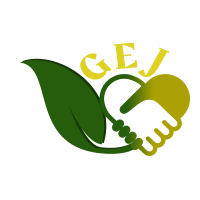Photo: Hui Maka'aiana o Makana community lo'i (taro patches) in Ha'ena, Kaua'i, Hawai'
Non-exhaustive List of EJ Organizations Connected to the Stanford Community
The Black Earth Farms Collective is an agroecological organization composed of skilled Pan-African and Pan-Indigenous farmers, builders, and educators who spread ancestral knowledge and train community members to build collectivized, autonomous, and chemical-free food systems in urban and peri-urban environments throughout the Greater East Bay Area. Their work regenerates their community’s connection to and reverence for land and agriculture, which was partially severed from their ancestors through colonial violence and their elders through multinational corporate exploitation. One of their main priorities is ensuring low-income and houseless communities in Berkeley, Oakland, Emeryville, and Richmond have consistent access to culturally relevant healthy food.
The California Environmental Justice Alliance is a statewide, community-led alliance that works to achieve environmental justice by advancing policy solutions. They unite the powerful local organizing of their members in the communities most impacted by environmental hazards – low-income communities and communities of color – to create comprehensive opportunities for change at a statewide level. Their three areas of focus are Climate Justice, Energy Equity, and Green Zones.
CIEA empowers California Indian communities to practice subsistence fishing cultures, avoid mercury and PCBs in fish, and self-advocate for California lands though three core programs:
- Mercury Tribal Health: CIEA encourages eating traditional fish that are high in Omega-3 fatty acids but free of mercury and PCBs through free educational presentations for California Tribes and to health clinics and WIC programs.
- Tribal Self-Advocacy: CIEA provides technical assistance for Tribal leadership and staff to increase their capacity to advocate on their own behalf for the benefit of their own People.
- Native Youth Environmental Leadership: CIEA provides students and community members with valuable experiences to address environmental toxins affecting Native communities and pathways to academic success through college internships, Tribal fellowships, and education for jr. high and high school youth.
The mission of CBE is to build people’s power in California’s communities of color and low-income communities to achieve environmental health and justice by preventing and reducing pollution and building green, healthy, and sustainable communities and environments. CBE provides residents in blighted and heavily polluted urban communities in California with organizing skills, leadership training and legal, scientific and technical assistance that they can use to successfully confront threats to their health and well-being.
EJCW plays a critical bridge-building role in connecting grassroots communities and statewide policy advocates across California in order to tackle structural inequity in how California’s water resources are managed. Their goals are to:
- Communicate: They coordinate a statewide message on the importance of identifying and meeting the water needs of the most under-served communities in California.
- Convene: They connect their members to each other and potential allies throughout the state. Their work brings a variety of local, regional, and statewide partners together.
- Collaborate: EJCW serves as the umbrella organization for California’s water justice movement. They maintain a strong presence in Sacramento and have conducted many successful advocacy campaigns.
The Karuk Tribe is a federally recognized Indian Tribe occupying aboriginal lands along the middle course of the Klamath and Salmon Rivers in Northern California. Climate change poses a threat to the Klamath ecosystem and to the Karuk culture, which is intimately intertwined with the presence, use, and management of cultural use species. In the context of climate change, the Karuk Tribe has been actively involved in climate planning with the understanding that tribal knowledge and management principles can be utilized to protect public as well as tribal trust resources.
Movement Generation Justice & Ecology Project inspires and engages in transformative action towards the liberation and restoration of land, labor, and culture. They are rooted in vibrant social movements led by low-income communities and communities of color committed to a Just Transition away from profit and pollution and towards healthy, resilient, and life-affirming local economies. Their three areas of work are Training & Analysis, Movement Building, and Advancing a New Narrative.
Planting Justice is a grassroots organization empowering people impacted by mass incarceration and other social inequities with the skills and resources to cultivate food sovereignty, economic justice, and community healing.
- Food Sovereignty: They work to address the structural inequalities that have become embedded in the industrialized food system, transforming it one garden at a time.
- Economic Justice: By building a local, sustainable food system, they aim to create thousands of green jobs that provide fair wages with comprehensive benefits for a dignified livelihood.
- Community Healing: They support the well-being of marginalized communities and are committed to suturing access to the resources that support holistic health through the provision of nutritious affordable food, dignified jobs, education, green space, safety & mobility.
Silicon Valley Toxics Coalition is a diverse non-profit organization engaged in research, advocacy, and grassroots organizing to promote human health and environmental justice in response to the rapid growth of the high-tech industry. Major areas of work include an Off-Grid Solar Score Card, Silicon Valley Toxics Coalition Sustainable Solar Incubator, Towards a Just and Sustainable Solar Industry, E-Waste, and Nanotechnology.
The Sogorea Te’ Land Trust is an urban, Indigenous, women-led community organization that facilitates the return of Chochenyo and Karkin Ohlone lands in the San Francisco Bay Area to Indigenous stewardship. Sogorea Te’ creates opportunities for all people living in Ohlone territory to work together to re-envision the Bay Area community and life on Ohlone land. Guided by the belief that land is the foundation that can bring us together, Sogorea Te’ calls on us all to heal from the legacies of colonialism and genocide, to remember different ways of living, and to do the work that our ancestors and future generations are calling us to do.
Youth United for Community Action (YUCA), a grassroots community organization created, led, and run by young people of color, the majority from low-income communities, provides a safe space for young people to empower themselves and work on environmental and social justice issues to establish positive systemic change through grassroots community organizing. YUCA’s three major areas of work are:
- Leadership Development: Through intense leadership development that is grounded in real-time community organizing, young people at YUCA prove that youth are not just the promise of the future, but all the possibilities of the present.
- Community Organizing: YUCA youth currently work on two campaigns: 1) to promote environmental health, justice, and anti-displacement principles in land use planning policies, and 2) to promote thriving school environments aiming to increase high school graduation rates and preparing students for college or careers.
- Taking Action: Whether by organizing Marches, Rallies, Demonstrations or Actions, YUCA mobilizes their community to take ACTION!
Allied Institutions

Global Environmental Justice Observatory at University of California, Santa Cruz
The Global Environmental Justice Observatory is part of a series of initiatives at the Department of Environmental Studies at UC Santa Cruz to promote the study and understanding of Global Environmental Justice. The group also produces a student edited peer-reviewed journal, Global Environmental Justice, that aims to highlight interdisciplinary research that explores communities and nations, especially historically-marginalized societies, that are impacted by environmental, social, and/or ecological changes.
The Global Environmental Justice Observatory is part of a series of initiatives at the Department of Environmental Studies at UC Santa Cruz to promote the study and understanding of Global Environmental Justice. The group also produces a student edited peer-reviewed journal, Global Environmental Justice, that aims to highlight interdisciplinary research that explores communities and nations, especially historically-marginalized societies, that are impacted by environmental, social, and/or ecological changes.

Global Pediatric Emergency Equity Lab
In our own backyards and around the globe, children are the ones hit hardest by inequity in healthcare. At Stanford’s Global Pediatric Emergency Equity Lab (GPEEL), we are developing new pathways to high-quality care for all through an informed and analytic approach that spans the social justice, health equity, and medical fields. Together, we’ll transform health systems worldwide to empower communities, hold governments accountable, and build resilient networks of care for the world’s children.
In our own backyards and around the globe, children are the ones hit hardest by inequity in healthcare. At Stanford’s Global Pediatric Emergency Equity Lab (GPEEL), we are developing new pathways to high-quality care for all through an informed and analytic approach that spans the social justice, health equity, and medical fields. Together, we’ll transform health systems worldwide to empower communities, hold governments accountable, and build resilient networks of care for the world’s children.